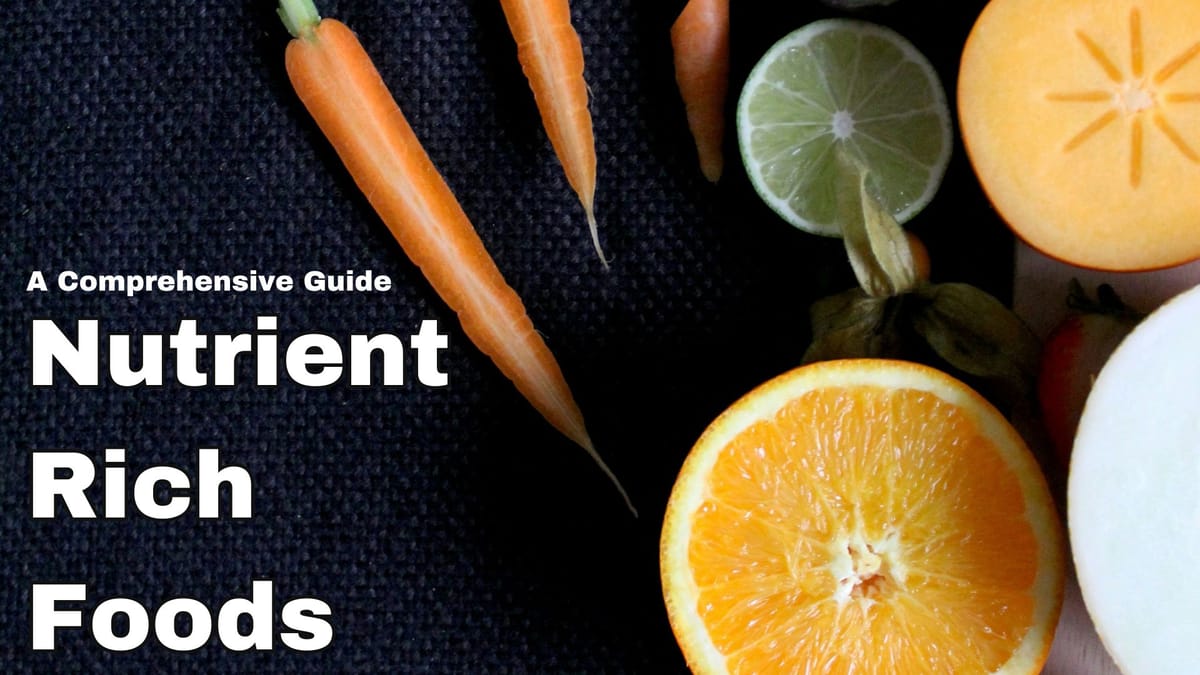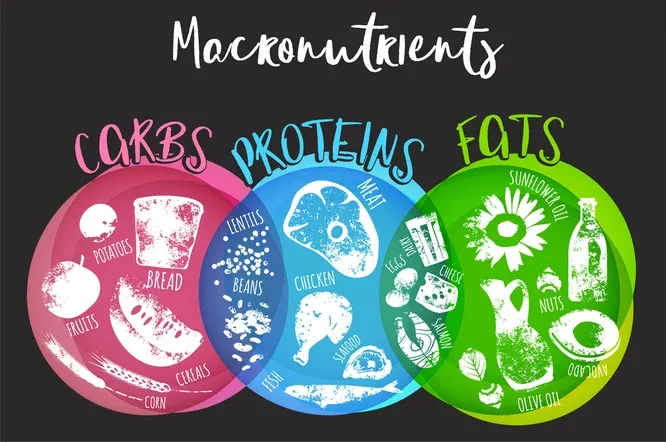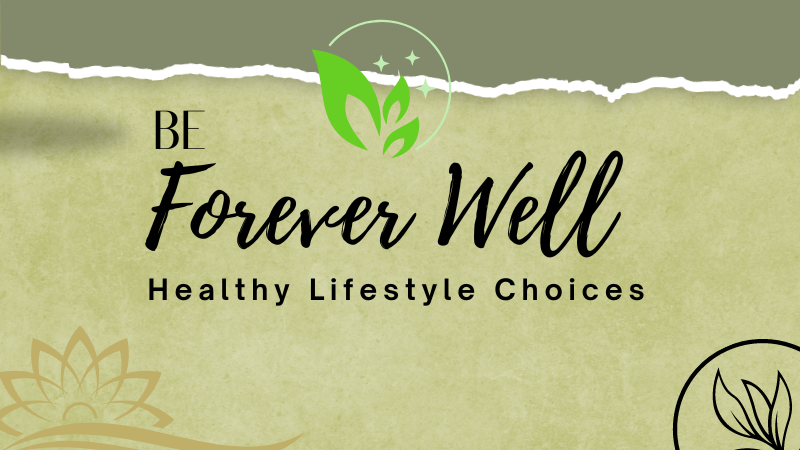The Power of Nutrient-Rich Foods: A Comprehensive Guide to Balanced Nutrition

In today's fast-paced world, many of us struggle to maintain a balanced and nutrient-rich diet. We often find ourselves reaching for convenient but unhealthy options, leading to nutrient deficiencies and various health issues.
Failing to consume a diverse range of nutrient-rich foods can deprive your body of essential vitamins, minerals, and other vital compounds necessary for optimal functioning. This can result in fatigue, weakened immunity, chronic diseases, and a general decline in overall well-being.
Fortunately, by understanding the importance of nutrient-rich foods and embracing balanced nutrition, you can unlock a path to vibrant health. In this comprehensive guide, we'll explore the vital role of essential nutrients, discuss various food groups, and provide practical tips to help you create a well-rounded diet tailored to your unique needs.
Essential Nutrients: The Building Blocks of Health
Have you ever wondered what makes nutrient-rich foods so vital for our well-being? The answer lies in the essential nutrients they provide – those crucial compounds our bodies cannot produce on their own but require for optimal function. Let's dive into the world of these essential nutrients and explore their roles in maintaining a balanced and vibrant life.
Macronutrients: The Energy Providers
1. Proteins
Proteins are the building blocks of life, essential for growth, repair, and overall bodily function. From muscle maintenance to enzyme production, these mighty macronutrients play a pivotal role. But have you ever considered the diverse sources of high-quality proteins? From lean meats and fish to plant-based options like legumes, nuts, and seeds, nature offers a treasure trove of protein-rich choices.
2. Carbohydrates
Ah, the often-misunderstood carbohydrates! While some perceive them as public enemy number one, the truth is that our bodies rely on these energy-packed nutrients for fuel. Complex carbohydrates found in whole grains, fruits, and vegetables provide sustained energy, fiber, and a host of other beneficial compounds. The key is to choose wisely and favor nutrient-dense options over highly processed, refined carbs.
3. Fats
Fats have long been demonized, but the reality is that our bodies require healthy fats for numerous vital functions. From supporting cell growth and protecting organs to aiding in nutrient absorption, fats play an essential role. The catch? Not all fats are created equal. Focus on incorporating monounsaturated and polyunsaturated fats from sources like avocados, nuts, seeds, and fatty fish into your diet.

Micronutrients: The Tiny but Mighty Warriors
1. Vitamins
Vitamins are nature's little helpers, each with its own unique superpower. From supporting immune function (hello, vitamin C!) to promoting bone health (we're looking at you, vitamin D), these micronutrients are true multitaskers. By consuming a diverse array of fruits, vegetables, whole grains, and lean proteins, you can ensure your body receives an ample supply of these vital compounds.
2. Minerals
Minerals are the unsung heroes of our diets, often overlooked but equally essential. Calcium, for instance, is crucial for strong bones and teeth, while iron plays a key role in oxygen transport. Potassium supports heart health, and zinc bolsters our immune system. Incorporating mineral-rich foods like leafy greens, nuts, seeds, and dairy products into your meals gives your body the support it craves.
- Phytochemicals: Nature's Protective Agents
Beyond the well-known nutrients, nutrient-rich foods also provide an array of phytochemicals – powerful plant compounds that act as nature's defenders. From the vibrant anthocyanins in berries to the resilient resveratrol in grapes, these phytochemicals offer antioxidant properties, help regulate cellular processes, and may even protect against chronic diseases. Embracing a colourful, plant-based diet is the key to unlocking the benefits of these remarkable compounds.
Balancing Act: Creating a Nutrient-Rich Lifestyle
Now that we've explored the essential nutrients and their roles, it's time to put this knowledge into practice. Achieving balanced nutrition is a delicate dance, but you can create a harmonious routine that nourishes your body and soul.
Embrace Variety: The Spice of Life
Imagine your diet as a grand symphony, with each nutrient-rich food contributing its unique melody. By embracing variety and incorporating a diverse array of whole, minimally processed foods, you can ensure your body receives a well-rounded supply of essential nutrients. From vibrant fruits and vegetables to whole grains, lean proteins, and healthy fats, the possibilities are endless.
Moderation: Finding the Sweet Spot
While nutrient-rich foods are undoubtedly the stars of the show, it's important to remember that even the healthiest of choices should be consumed in moderation. Portion control and mindful eating are key to maintaining a balanced lifestyle. Savor each bite, listen to your body's hunger cues, and remember that true nourishment comes not only from what's on your plate but also from the joy and gratitude you bring to the table.
RELATED ARTICLE

Mindful Meal Planning: A Roadmap to Success
Embracing balanced nutrition can be a breeze with a little planning and preparation. Take the time to thoughtfully craft your weekly meals, incorporating a diverse array of nutrient-rich ingredients. Batch cooking and meal prepping can be game-changers, ensuring you always have healthy options on hand, even on the busiest of days.
Celebrate Progress: One Step at a Time
Remember, transforming your lifestyle is a journey, not a destination. Celebrate each small step towards a more balanced and nutrient-rich existence. Whether it's swapping out processed snacks for nutrient-dense alternatives or experimenting with new, wholesome recipes, every positive change is worthy of applause.
Conclusion: Nourishing Your Life, One Bite at a Time
In this comprehensive guide, we've explored the power of nutrient-rich foods and the essential role they play in achieving balanced nutrition. From macronutrients that fuel our bodies to micronutrients that protect and support our well-being, each nutrient holds a unique significance.
Embracing a diverse, whole-food-based diet rich in fruits, vegetables, whole grains, lean proteins, and healthy fats is the key to unlocking a world of vibrant health and vitality. Remember, true nourishment extends beyond the physical – it's a celebration of the joy and gratitude that comes from embracing a balanced, nutrient-rich lifestyle.
So, are you ready to embark on this transformative journey? Nourish your mind, body, and soul with the power of nutrient-rich foods and witness the remarkable changes that unfold. One bite at a time, you're paving the way towards a life filled with boundless energy, radiant well-being, and a deeper connection to the nourishing gifts of nature.
FAQ's
- What are Nutrient-Rich Foods? Nutrient-rich foods are those that provide a high amount of vitamins, minerals, and other essential nutrients relative to their calorie content. These foods are crucial for maintaining overall health and well-being.
- Why is Balanced Nutrition Important? Balanced nutrition is essential for supporting bodily functions, promoting optimal health, and reducing the risk of chronic diseases. It ensures that your body receives the necessary nutrients to function at its best.
- How can I Incorporate Nutrient-Rich Foods into my Diet? You can incorporate nutrient-rich foods into your diet by including a variety of fruits, vegetables, whole grains, lean proteins, and healthy fats. Aim for a colorful plate to ensure you're getting a wide range of nutrients.
- What are the Benefits of Eating Nutrient-Rich Foods? Eating nutrient-rich foods can boost your immune system, improve energy levels, support weight management, enhance cognitive function, and reduce the risk of developing various health conditions.
- Are Supplements Necessary if I Eat Nutrient-Rich Foods? In most cases, if you have a balanced diet rich in nutrient-dense foods, you may not need supplements. However, it's always best to consult with a healthcare provider or nutritionist to determine if you have any specific deficiencies that may require supplementation.
- Can I Still Enjoy Treats and Snacks While Following a Nutrient-Rich Diet? Yes, you can still enjoy treats and snacks while following a nutrient-rich diet. The key is moderation and balance. Opt for healthier versions of snacks or treats when possible and make sure they complement your overall nutrient intake.
- How Can I Plan Meals that Incorporate Nutrient-Rich Foods? To plan meals that incorporate nutrient-rich foods, start by creating a balanced plate with a variety of colors and food groups. Include sources of lean protein, whole grains, fruits, vegetables, and healthy fats in each meal to ensure you're getting a wide range of nutrients.
- Are Organic Foods Considered More Nutrient-Rich? While organic foods may offer some benefits such as reduced exposure to pesticides, there isn't substantial evidence to suggest that they are significantly more nutrient-rich than conventionally grown foods. Focus on variety and quality when choosing your foods.
- How Can I Stay Motivated to Maintain a Nutrient-Rich Diet? To stay motivated to maintain a nutrient-rich diet, set realistic goals, track your progress, experiment with new recipes and flavors, involve friends or family in meal planning, and remind yourself of the positive impact good nutrition has on your overall well-being.
- Where Can I Find Reliable Information on Nutrient-Rich Foods and Balanced Nutrition? Reliable sources for information on nutrient-rich foods and balanced nutrition include registered dietitians, reputable health websites like the USDA's ChooseMyPlate.gov or the Academy of Nutrition and Dietetics website, as well as scientific journals and publications related to nutrition and health.






